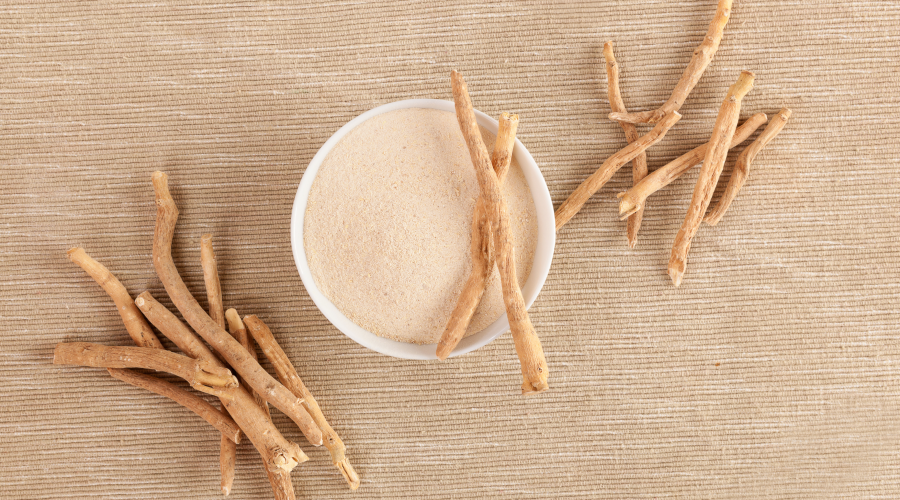Ayurveda is an ancient holistic healing system originating from India. It’s often called the oldest form of healthcare.
Ayurvedic medicine promotes mental, emotional, and physical wellness through diet, detoxification, yoga, meditation, and other lifestyle changes. Herbs are also highly valued in Ayurveda. Practitioners harness Mother Nature to heal the body.
In this article, we explore a list of ayurvedic herbs for optimal health.

1. St. John’s Wort
St. John’s wort (Hypericum perforatum) is a plant that produces vibrant yellow flowers. It’s used in Ayurvedic medicine and is making a splash in mainstream healthcare as a treatment for mild-to-moderate depression. In fact, it may be as effective as common antidepressant medications without the side effects1. It may also help women with physical and emotional symptoms of PMS2.
How to use: St. John’s wort is available in tea, tablet, capsule, and tincture form. However, this herb may reduce the effectiveness of some medications, so consult your doctor if you’re on birth control, antidepressants, or other chronic medications.
2. Ashwagandha
Ashwagandha (Withania somnifera) is a shrub that grows in India and the Middle East. The root is a popular health tonic in Ayurveda where it’s known as an adaptogen.
An adaptogen helps your body adapt to chronic physical and emotional stress3. It’s an ideal supplement to take the edge off anxiety and give you stamina in the gym.
How to use: Standardised ashwagandha extract is widely available as powder and capsules. Doses of 250-600 mg per day may be effective for anxiety.
3. Gotu kola
Gotu Kola (Centella asiatica) is an Asian herb known as “the herb of longevity” for its anti-ageing properties. Interestingly, gotu kola has no scent or taste, despite being in the same family as parsley.
Gotu kola extract (made from the leaves and stems) may also improve mental health symptoms4 and boost memory5.
How to use: Gotu kola is available in powder, capsules, tincture, and tea. 1000 mg per day of standardised gotu kola may be effective for anxiety.
4. Turmeric
Turmeric (Curcuma longa) is probably in your kitchen cupboard right now. It’s known as the “golden root” and is used to make a wide variety of South Indian curries, stews, and marinades. But its real power lies in an active compound called curcumin.
Curcumin gives turmeric its vibrant orange colour, and research shows it’s a potent anti-inflammatory6. It also has antidepressant properties, rivalling the effectiveness of common medications7.
How to use: In ayurvedic medicine, turmeric is used in a drink called “golden milk.” On the stove, gently heat one cup of coconut milk, a teaspoon of turmeric, a crack of black pepper, and a dash of honey. Stir well and enjoy warm.
5. Bitter melon
Bitter melon (Momordica charantia) – also known as bitter gourd – is a tropical fruit used in traditional Indian medicine and cuisine. It’s related to zucchini and pumpkin and looks a bit like a cucumber with bumps on the skin.
Modern science has latched onto bitter melon extract for improving blood sugar levels in type-2 diabetics8.
How to use: According to research, 2000 mg of bitter melon extract helps type-2 diabetics manage blood glucose levels over the long term. But ensure the product you choose is third-party tested for active compounds.
6. Boswellia
Boswellia extract comes from the resin of the Boswellia serrata tree native to India, North Africa, and the Middle East.
In Ayurveda, Boswellia is a natural anti-inflammatory and pain-reliever, helping those with chronic inflammatory diseases like rheumatoid arthritis.
How to take: You can find Boswellia in capsules, powder, and tea. It’s also in topical creams intended to soothe inflamed joints and muscles.
7. Tulsi
Tulsi – or Holy Basil – is another adaptogenic herb native to Southeast Asia. It’s considered sacred in Indian cultures for nourishing the body, mind, and spirit.
Studies have found tulsi is a natural blood sugar regulator that helps non-insulin-dependent diabetics9.
How to use: Tulsi tea is a delicious warming drink when consumed with a dash of honey.
8. Neem
Neem comes from the Azadirachta indica tree, grown on the Indian subcontinent.
The leaves and flowers contain more than 100 active compounds with antimicrobial, antioxidant, and anti-inflammatory properties. It’s also one of the most useful ayurvedic herbs for hair growth.
How to use: Neem is different to other herbs on this list because it’s usually used topically.
Neem essential oil and neem shampoo are great for supporting healthy hair and skin. It’s ideal for treating skin inflammation, head lice, dandruff, acne, and cuts. Plus, diffusing neem oil can keep mosquitos and other pests away making it great for DIY pest control!
9. Triphala
As the word “tri” suggests, Triphala combines three different Indian fruit extracts: Amla, Bibhitaki, and Haritaki.
There’s strong evidence that this herb can reduce inflammation and support gut health10. In Ayurveda, it’s popular for treating constipation.
How to use: Triphala is available as a tincture, powder, or herbal tablet in most health stores or from an Ayurvedic practitioner. Some Ayurvedic toothpastes use Triphala to reduce oral inflammation and plaque.
10. Shatavari
Shatavari is part of the asparagus family and thrives in tropical climates across India and Asia. Traditionally, it helps women manage hormonal and reproductive health issues11.
How to use: Speak to an Ayurvedic doctor to find the right Shatavari dose for your needs.
11. Coleus Forskohlii
Native to Southeast Asia, Coleus Forskohlii is a relative of the mint plant. It’s a funny-sounding herb – but it has been part of Ayurvedic medicine for centuries.
It is one of the most popular ayurvedic herbs for weight loss. An active compound in the root of the plant, forskolin, can boost energy and reduce body fat12. Some people call it “lightning in a bottle.”
How to take: The optimal dose is 250-500 mg daily of standardised Coleus forskohlii extract.
Final thoughts
When used in conjunction with a healthy ayurvedic diet, regular exercise, and stress management, Ayurvedic herbs can have a powerful effect on your overall well-being.
However, check with your doctor or healthcare provider before using new herbal products. Alternatively, consult an Ayurvedic doctor for guidance.
You can find an Ayurvedic practitioner in your area with our Treatwiser Directory.
- Ng et al. (2017). Clinical use of Hypericum perforatum (St John’s wort) in depression. J Affect Disord.
- Canning et al. (2010). The efficacy of Hypericum perforatum (St John’s wort) for the treatment of premenstrual syndrome. CNS Drugs.
- Salve et al. (2019). Adaptogenic and Anxiolytic Effects of Ashwagandha Root Extract in Healthy Adults. Cureus.
- Jana et al. (2010). A clinical study on the management of generalized anxiety disorder with Centella asiatica. Nepal Med Coll J.
- Farhana et al. (2016). Effectiveness of Gotu Kola Extract 750 mg and 1000 mg Compared with Folic Acid 3 mg in Improving Vascular Cognitive Impairment after Stroke. Evid Based Complement Alternat Med.
- Chainani-Wu N. (2003). Safety and anti-inflammatory activity of curcumin: a component of turmeric (Curcuma longa). J Altern Complement Med.
- Sanmukhani et al. (2014). Efficacy and safety of curcumin in major depressive disorder: a randomized controlled trial. Phytother Res.
- Cortez-Navarrete et al. (2018). Momordica charantia Administration Improves Insulin Secretion in Type 2 Diabetes Mellitus. J Med Food.
- Agrawal et al. (1996). Randomized placebo-controlled, single blind trial of holy basil leaves in patients with noninsulin-dependent diabetes mellitus. Int J Clin Pharmacol Ther.
- Peterson et al. (2017). Therapeutic Uses of Triphala in Ayurvedic Medicine. J Altern Complement Med.
- Pandey et al. (2018). Impact of stress on female reproductive health disorders: Possible beneficial effects of shatavari (Asparagus racemosus). Biomed Pharmacother.
- Godard et al. (2005). Body composition and hormonal adaptations associated with forskolin consumption in overweight and obese men. Obes Res.





